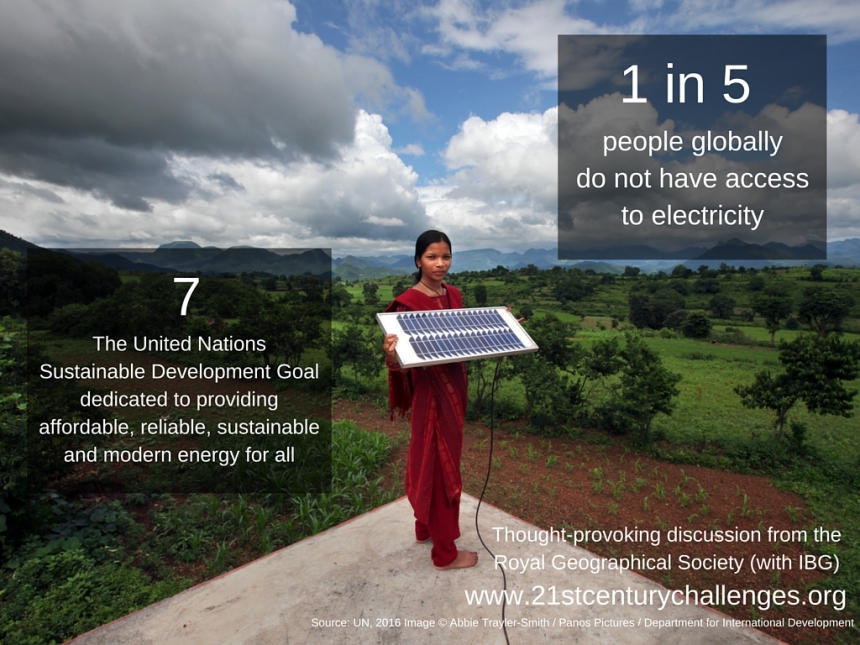Energy for development

21st Century Challenges held a panel discussion on Wednesday 24 February at the Royal Geographical Society (with IBG) to discuss how can we support local entrepreneurship and help the world’s poorest communities gain access.
Sarah Best, Senior researcher at the International Institute for Environment and Development (IIED)
What is energy access? This sounds like a very simple question, but in fact for many decades governments have got it rather wrong in terms of defining what energy access means.
In Argentina many years ago, up at the border with Bolivia, I was reviewing a government programme, funded by the World Bank, that was trying to provide access to electricity to the remaining three per cent of Argentina’s population that doesn’t have it. They were using solar home systems, because it was just too expensive to extend the centralised grid there. [The solar systems] enabled children to study at night, because the quality of the light was so much better. If you talked to teachers, it meant they could prepare their classes for the next day. But what quickly became very apparent was that while people were happy with their lighting, they wanted power to do more things. Many people talked about having energy to pump water for irrigation and for clean drinking water. Within the boundaries of the programme, these people had ‘access’. But for the people themselves, what they wanted in order to live a prosperous and fulfilling life was ‘more’ – they wanted more power and more appliances.
So it’s really important that we understand what energy access is; that it’s not just about the supply of technology or megawatts. It’s what leads to better lives. If we get the goal right of what energy access is suppose to do, then we’ll find the right solutions.
Anna Halpern-Lande, senior venture principal at Shell Technology Ventures
Sometimes access to energy can get overlooked in discussions about development. Society focuses on access to food, water, medicine, to sustainable economic employment. But sometimes we don’t recognise that energy is the bedrock of economic and social development. It helps factories to run, hospitals to operate, schools and homes to be lit and heated, people and goods to be transported, and it truly transforms lives.
If we want to do some good, if we want to change the world, we need to look for ways to support more equitable sustainable energy systems, and to lift more and more people out of energy poverty. Because without being lifted out of energy poverty, they’re not going to get out of any other kind of poverty.
There is no one single way of improving access to energy. It requires a combination of innovation, entrepreneurship, social investment, collaboration, and commercial development. It requires detailed attention to local needs and context, and building coalitions of partnerships, careful planning, and long-term commitment. But the ideas are out there and the private sector can play a real role in developing them into commercial sustainable solutions. All of which adds up to an increasing number of opportunities for entrepreneurs and innovators, and most fundamentally, to consumers and communities to secure their energy needs. So there are many challenges ahead, but some real reasons to be optimistic.
Dr Simon Bransfield-Garth, CEO of Azuri Technologies Ltd
For half the population in Africa there is no electricity, there is no sanitation, there is no water. In fact, there is only one universal utility in the world and that is the mobile phone. So we’ve got this really strange situation where people have access to some kind of technology that is really modern, and yet people are still suffering with technology that really hasn’t changed for millennia.
Quite often people talk about this as a development problem. Actually, I take a slightly contrarian view – this is a market failure. The poorest people in the world aren’t spending a few per cent more for their energy; they’re spending orders of magnitude more. That’s a market failure and the great thing about market failures is that actually the market can do something about that.
Energy is an enabler, and the most important thing it enables is the knowledge economy. In our view, it is the knowledge economy which is going to enable continents like Africa to be able to develop much more rapidly than other societies have been able to develop. Something like 40 per cent of the population of Africa is under the age of 14. I’ve never met a 14-year-old who can’t use a smartphone. There is tremendous energy, there is tremendous appetite, the aspiration is there, the excitement is there, and what we need to do is to provide services – and the energy that drives those services – that enable that aspiration to turn into reality.
Dr Gabrielle Walker, chief scientist at Xynteo
Energy is the dominant contributor to climate change. In this question of energy access, climate and access to energy have in the past seemed like they were opposite poles of this story. Either you give people access to energy and lift them out of poverty, or you can deal with climate change. But the old narrative was that you can’t do both. That has now changed.
One of the reasons for that has been the plummeting costs of renewable energy, and the possibilities that renewable energy brings – bringing access to energy to places that are outside urban centres and away from the grid. I find that a very positive thing, that we’re now finding our imperative to bring wellbeing to lift people out of poverty goes hand-in-hand with our imperative to deal with climate change.
Summary by Chris Fitch, reporter, Geographical magazine
Photo © Abbie Trayler-Smith / Panos Pictures / Department for International Development

